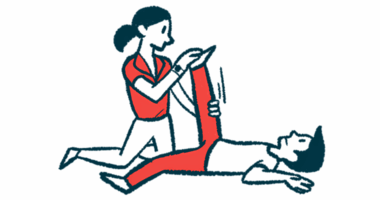My Husband, Who Has Hemophilia, Is Not a Child

My husband, Jared, and I are two weeks into our self-sufficiency journey. Just last week, our family moved into a rented condo. We spent some time and money to fix up the place and repair damages. So far, Jared’s handyman skills have improved a great deal. He likes that he can somehow “catch up” with his male peers.
In our society, there is an unspoken expectation that men should be able to do household repairs and other DIY work. Because he didn’t have the opportunity to practice these skills when he was younger, he sometimes feels left behind — though the speed at which he learns new skills suggests otherwise!
I’ve always known Jared to be a capable, hardworking, and resourceful man. He’d often spend hours tinkering with our daughter’s broken electronic toys until he got them to work again. He’d seal jars way too tightly, and watch with wonder as I struggled to open them. Then, he’d make a smug face and open their lids with a single, quick motion.
At first glance, his large physique, bulging biceps, and thick forearms almost completely obscure the fact that he has a chronic bleeding disorder. No one would guess that he bleeds almost every month.
I don’t think about it much, either. I know for a fact that he is physically strong, and although he has some bad days with hemophilia, he is also quick to recover. Better yet, he’s intentional about recovery.
While most people tend to shun work and chores, he is drawn to them. He considers himself blessed whenever he can be “of use” to someone. It’s a refreshing perspective to have, and one I wish to incorporate in my own life.
In my eyes, Jared is a self-sufficient and skilled adult. I always say that we are equal partners in our marriage. Each of us has something unique and useful to contribute to our partnership — and now, to our own household.
That’s why I’m surprised some people still see him as a child. They even occasionally treat him like one by making decisions for him, or doubting his ability to figure out what’s best for himself. This might not be intentional, but it does happen.
People often communicate this message through their actions. It could be as simple as not letting him carry heavy things for fear of an injury. It could be an employer’s assumption that he cannot handle a typical office workload, or that he will have poor attendance due to his hemophilia and seizure disorder. It could even be an opposition to his desire for independence.
I recently came across an article on The Mighty in which contributor Amelia Blackwater spoke up against the infantilization of adults with disabilities. Using sexuality as a starting point, she writes that disabled people are capable of “adult” things and have the same desires as most. Believing that disabled people “ought” to be asexual, naive, and childlike only gives birth to more misconceptions about what they’re really like, and who they really are. It can also prevent them from reaching their full potential as human beings.
When I got to know some of my husband’s friends from his hemophilia organization, I felt like I was simply getting to know people my age. Whenever we got together, we’d exchange naughty jokes, play music and board games, and trade secrets. Aside from their health conditions, and perhaps their heightened patience (a byproduct of lifelong illness), nothing in particular set them too far apart from my other friends.
I don’t believe that people with disabilities are inherently weak. As a matter of fact, the disabled people in my life are some of the strongest people I know. Thinking of people with disabilities as weak or disadvantaged is not natural. Much like racism or sexism, negative attitudes toward people with disabilities are learned.
Our young daughter doesn’t think less of her dad simply because he’s missing a clotting factor. She doesn’t compare him with other people. To her, he’s just Daddy. He’s got strong arms capable of swinging her so high that her feet touch the ceiling. He’s patient with her every night, even when she’s both sleepy and cranky. He still cradles her in his arms and rocks her to sleep.
In our home, disability is normalized. Hemophilia doesn’t detract from our combined ability to make decisions for the household. And that’s the way I hope things will always be.
***
Note: Hemophilia News Today is strictly a news and information website about the disease. It does not provide medical advice, diagnosis, or treatment. This content is not intended to be a substitute for professional medical advice, diagnosis, or treatment. Always seek the advice of your physician or another qualified health provider with any questions you may have regarding a medical condition. Never disregard professional medical advice or delay in seeking it because of something you have read on this website. The opinions expressed in this column are not those of Hemophilia News Today or its parent company, Bionews Services, and are intended to spark discussion about issues pertaining to hemophilia.








Leave a comment
Fill in the required fields to post. Your email address will not be published.